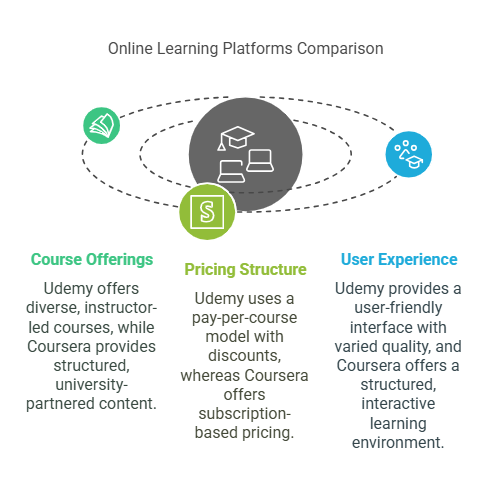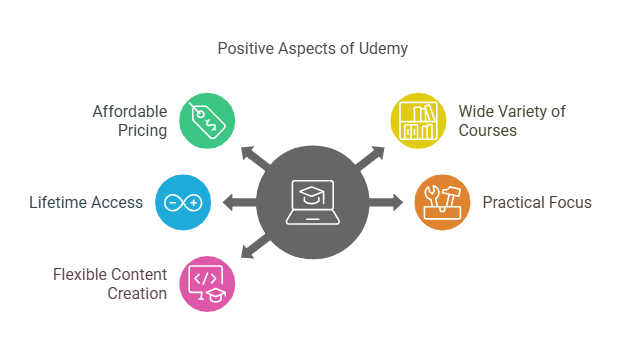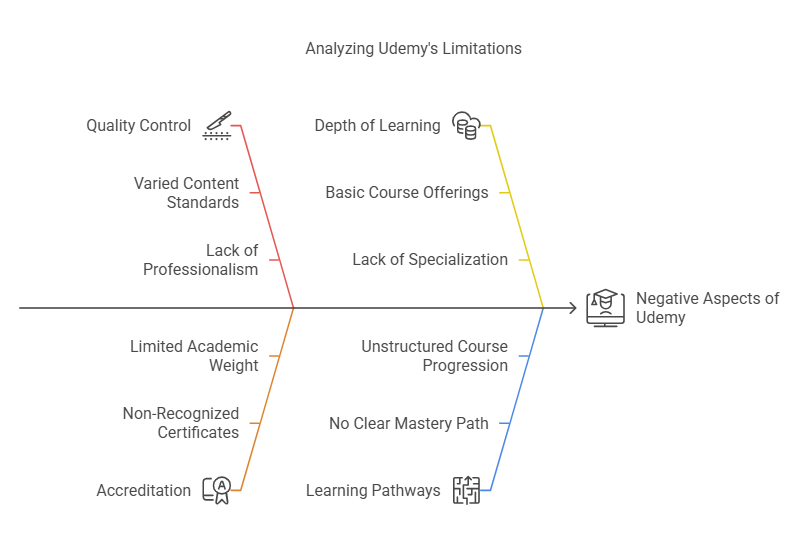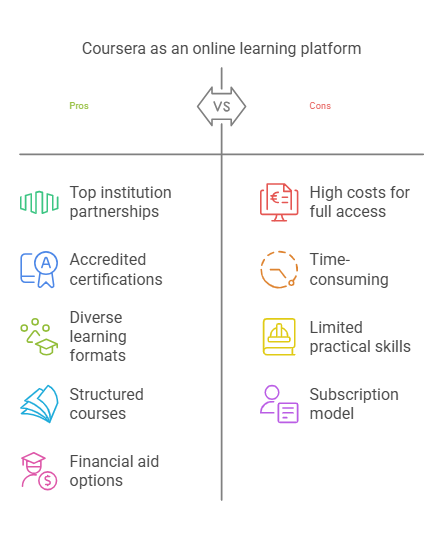Udemy vs Coursera: A Comprehensive Comparison
When considering online learning platforms, Udemy and Coursera stand out as two of the most prominent choices. While both platforms offer a vast array of courses across various disciplines, their structure, pricing, and overall objectives differ significantly. In this article, we will explore the positives and negatives of Udemy and Coursera to help you decide which platform suits your learning needs.

Udemy vs Coursera: A Comprehensive Comparison
1. Overview of Udemy and Coursera
Udemy
Udemy is a marketplace for online learning, offering over 200,000 courses on topics ranging from programming to personal development. Courses are created by instructors worldwide, and anyone can publish content on the platform. It is primarily aimed at learners who seek practical skills and self-paced learning.
Coursera
Coursera collaborates with universities and institutions to provide academic-level courses. With over 7,000 courses, it focuses on degree programs, certifications, and professional development. It targets learners aiming to advance their careers or pursue formal education online.
2. Positive Aspects of Udemy
Affordable Pricing:
Udemy courses are usually priced between $10 and $30 during frequent sales, making it a budget-friendly option for learners.
Wide Variety of Courses:
The platform offers courses in nearly every imaginable subject, including niche areas like photography, cake decorating, and meditation.
Lifetime Access:
Once you purchase a course, you can access its content forever, allowing you to learn at your own pace.
Practical Focus:
Udemy’s courses are often hands-on, catering to individuals seeking immediate skills like coding, video editing, or language learning.
Flexible Content Creation:
Instructors can freely publish courses, which leads to a diverse array of teaching styles and content.

3. Negative Aspects of Udemy
Quality Control Issues:
Since anyone can create and upload courses, the quality of content varies widely. Some courses may lack depth or professionalism.
Limited Accreditation:
Udemy courses are not accredited, meaning they may not carry significant weight in academic or professional settings.
Surface-Level Learning:
Many courses provide basic knowledge without delving into advanced or specialized topics.
No Structured Learning Paths:
Udemy lacks clear pathways for achieving mastery in a subject, making it less suitable for systematic learning.

4. Positive Aspects of Coursera
Partnership with Top Institutions:
Coursera collaborates with prestigious universities like Stanford, Yale, and Duke, ensuring high-quality, well-researched content.
Accredited Certifications:
The platform offers certificates and degrees that are recognized worldwide, adding value to a learner’s resume.
Diverse Learning Formats:
From short courses to full-fledged degree programs, Coursera caters to both casual learners and serious academic pursuits.
Structured Courses:
Courses are often designed as part of a specialization or degree program, allowing learners to progress systematically.
Financial Aid Options:
Coursera provides financial aid for learners who cannot afford course fees, promoting inclusivity.
5. Negative Aspects of Coursera
High Costs for Full Access:
While some courses are free to audit, obtaining certificates or pursuing degree programs can be expensive, ranging from $39 per course to thousands of dollars for degrees.
Time-Consuming:
Many Coursera courses require weekly assignments and exams, demanding significant time and effort.
Limited Focus on Practical Skills:
Unlike Udemy, Coursera’s focus is more academic and theoretical, which might not suit individuals seeking immediate skill application.
Subscription Model:
Many courses require a Coursera Plus subscription, which can be costly for learners who only want specific courses.

6. Comparison: Udemy vs Coursera
7. Choosing the Right Platform
The decision between Udemy and Coursera ultimately depends on your goals, budget, and learning preferences:
Choose Udemy if:
You want to acquire practical skills quickly.
You are looking for affordable courses.
You prefer self-paced learning without deadlines.
Choose Coursera if:
You aim to earn a certificate or degree from a reputable institution.
You are seeking in-depth, structured courses.
You need accredited qualifications for career advancement.
Read about me :coursera upgrade specialization not working
FAQs
1. Which is better for career advancement, Udemy or Coursera?
Coursera is generally better for career advancement as it offers accredited certificates, university partnerships, and professional degree programs. However, Udemy is a good choice for learning specific skills at a lower cost.
2. Are certificates from Udemy and Coursera recognized by employers?
Coursera certificates are often recognized by employers due to partnerships with universities and organizations like Google and IBM. Udemy certificates, while helpful, are not formally accredited and are better for personal skill-building.
3. Which platform is more affordable?
Udemy is usually more affordable, with courses often available for as little as $10-$20 during sales. Coursera offers subscription plans or higher-priced courses, but financial aid is available for many programs.
4. Can I access courses for free on these platforms?
Coursera offers many free courses, though certification requires payment. Udemy doesn’t have a free course catalog, but it occasionally offers free promotions on specific courses.
5. What topics do Udemy and Coursera focus on?
Udemy covers a broad range of topics, including niche skills like photography or personal development. Coursera focuses on academic subjects, professional certifications, and degree programs.
6. Do both platforms offer lifetime access to courses?
Udemy provides lifetime access to purchased courses. Coursera’s access depends on the course type; some courses are accessible only during the subscription or enrollment period.
7. Which platform is better for beginners?
Udemy is more beginner-friendly due to its affordable pricing and diverse range of entry-level courses. Coursera is ideal for learners seeking structured programs with expert guidance.
Conclusion
Both Udemy and Coursera have their strengths and weaknesses, catering to different types of learners. Udemy excels in affordability, flexibility, and practical skills, while Coursera stands out with its academic rigor, certification value, and partnership with top institutions. Understanding your learning goals is key to making the right choice. Whether you choose Udemy or Coursera, both platforms offer valuable resources to empower your personal and professional growth.


